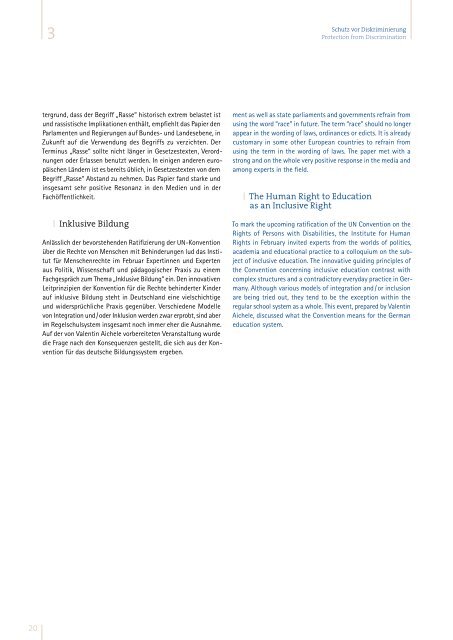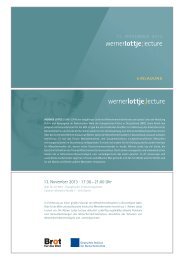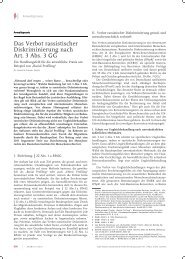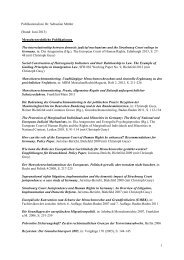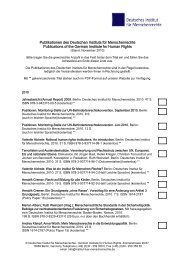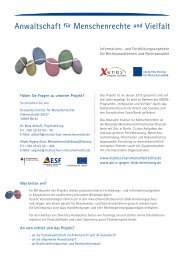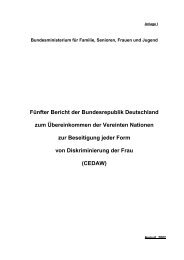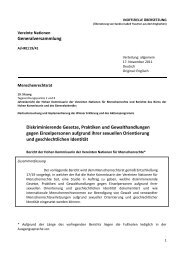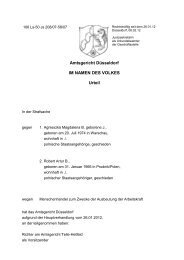Download - Deutsches Institut für Menschenrechte
Download - Deutsches Institut für Menschenrechte
Download - Deutsches Institut für Menschenrechte
Sie wollen auch ein ePaper? Erhöhen Sie die Reichweite Ihrer Titel.
YUMPU macht aus Druck-PDFs automatisch weboptimierte ePaper, die Google liebt.
3<br />
Schutz vor Diskriminierung<br />
Protection from Discrimination<br />
tergrund, dass der Begriff „Rasse“ historisch extrem belastet ist<br />
und rassistische Implikationen enthält, empfiehlt das Papier den<br />
Parlamenten und Regierungen auf Bundes- und Landesebene, in<br />
Zukunft auf die Verwendung des Begriffs zu verzichten. Der<br />
Termi nus „Rasse“ sollte nicht länger in Gesetzestexten, Verordnungen<br />
oder Erlassen benutzt werden. In einigen anderen europäischen<br />
Ländern ist es bereits üblich, in Gesetzestexten von dem<br />
Begriff „Rasse“ Abstand zu nehmen. Das Papier fand starke und<br />
insgesamt sehr positive Resonanz in den Medien und in der<br />
Fachöffentlichkeit.<br />
| | Inklusive Bildung<br />
Anlässlich der bevorstehenden Ratifizierung der UN-Konvention<br />
über die Rechte von Menschen mit Behinderungen lud das <strong>Institut</strong><br />
für <strong>Menschenrechte</strong> im Februar Expertinnen und Experten<br />
aus Politik, Wissenschaft und pädagogischer Praxis zu einem<br />
Fachgespräch zum Thema „Inklusive Bildung“ ein. Den innovativen<br />
Leitprinzipien der Konvention für die Rechte behinderter Kinder<br />
auf inklusive Bildung steht in Deutschland eine vielschichtige<br />
und widersprüchliche Praxis gegenüber. Verschiedene Modelle<br />
von Integration und / oder Inklusion werden zwar erprobt, sind aber<br />
im Regelschulsystem insgesamt noch immer eher die Ausnahme.<br />
Auf der von Valentin Aichele vorbereiteten Veranstaltung wurde<br />
die Frage nach den Konsequenzen gestellt, die sich aus der Konvention<br />
für das deutsche Bildungssystem ergeben.<br />
ment as well as state parliaments and governments refrain from<br />
using the word “race” in future. The term “race” should no longer<br />
appear in the wording of laws, ordinances or edicts. It is already<br />
customary in some other European countries to refrain from<br />
using the term in the wording of laws. The paper met with a<br />
strong and on the whole very positive response in the media and<br />
among experts in the field.<br />
| | The Human Right to Education<br />
as an Inclusive Right<br />
To mark the upcoming ratification of the UN Convention on the<br />
Rights of Persons with Disabilities, the <strong>Institut</strong>e for Human<br />
Rights in February invited experts from the worlds of politics,<br />
academia and educational practice to a colloquium on the subject<br />
of inclusive education. The innovative guiding principles of<br />
the Convention concerning inclusive education contrast with<br />
complex structures and a contradictory everyday practice in Germany.<br />
Although various models of integration and / or inclusion<br />
are being tried out, they tend to be the exception within the<br />
regular school system as a whole. This event, prepared by Valen tin<br />
Aichele, discussed what the Convention means for the German<br />
education system.<br />
20


